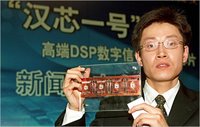more science fraud
 a chinese computer scientist, who supposedly designed China's first dsp chip, apparently faked all the research, stealing the plans from a foreign company. nyt asks: "Could Mr. Chen's downfall, they ask, represent an example of how even smart and successful people in China are being forced to cut corners to meet the nation's hyper-ambitious goals?"
a chinese computer scientist, who supposedly designed China's first dsp chip, apparently faked all the research, stealing the plans from a foreign company. nyt asks: "Could Mr. Chen's downfall, they ask, represent an example of how even smart and successful people in China are being forced to cut corners to meet the nation's hyper-ambitious goals?"The article included this ominous quote: "Professor Chen is really unlucky," said a male student named Wu, who asked not to be further identified for fear of recriminations. "He lied and was caught. I think there are other people faking their research, but they haven't been caught yet. He's probably not the worst."
I'm glad nyt steered clear of challenging the peer-review process on this one. research fraud is of primary importance, and it's understandable that the larger community has begun to question science's system of checks. but it's dangerous and irresponsible to reject the peer-review process as flawed when it's not only worked quite well in general, but also has no viable alternative.



0 Comments:
Post a Comment
<< Home